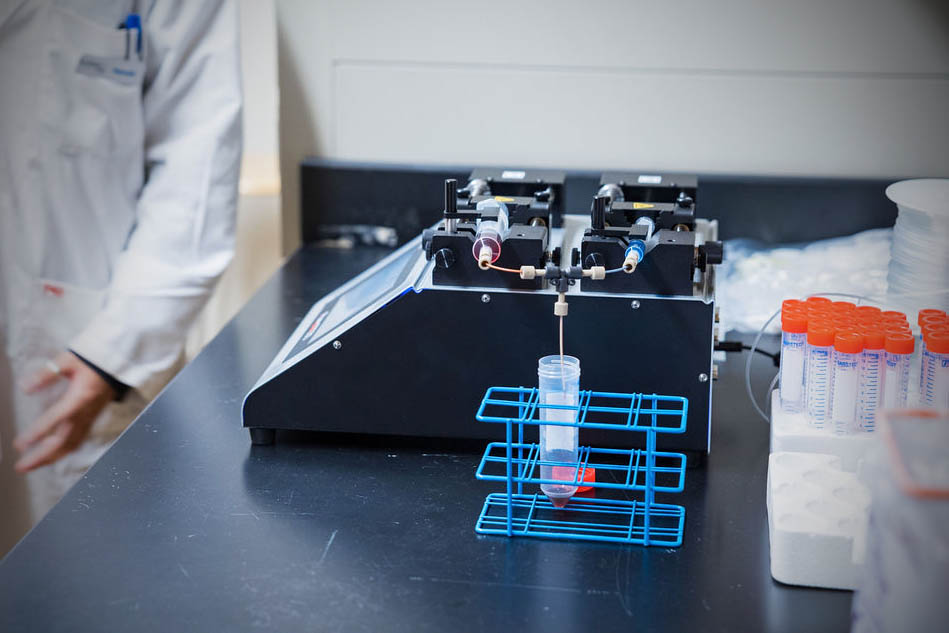Awards and recognition
Dr. Anna Blakney and collaborators awarded New Frontiers in Research Fund grant
MSL Faculty member Dr. Anna Blakney and collaborators have received support from the New Frontiers in Research Fund (NFRF) for a novel project which aims to develop new treatment approaches for neurodegenerative disorders such Alzheimer’s, stroke and epilepsy. The funding program supports global innovation and encourages a high degree of interdisciplinary collaboration.
Blakney and a team of approximately 25 other scientists received 24 million dollars over 6 years for their project: “A pipeline approach for the rational design of neuronal lineage conversion approaches to treat neurological disorders”. Part of the NFRF Transformation stream, projects under this purview are “…designed to support large-scale, Canadian-led interdisciplinary research projects that address a major challenge with the potential to realize real and lasting change”. Lead researcher on the project is Dr. Carol Schuurmans, Senior Scientist and Dixon Family Chair in Ophthalmology Research at Sunnybrook Research Institute, and Professor in Biochemistry and Laboratory Medicine and Pathobiology at University of Toronto. Dr. Blakney brings her expertise with RNA technology to the table and is excited to expand her lab’s research activities in new directions.
“We are experienced with making RNA and using nanoparticles to deliver it to certain cells. But this is a brand-new application that we haven’t worked in before with the neurological space. It’s a hugely challenging but impactful area and an exciting field,” says Blakney.
The goal of the project is to use RNA to reprogram cells to try and develop new treatments for neurological diseases. Blakney’s role is to design mRNAs and saRNA with certain transcription factors (proteins) that will be able to convert stem cells into neurological cells. These can then be used for the regeneration of damage to the brain due to disease or injury.
“We have all these stem cells within our body that are capable of becoming many types of cells. If you direct them in a certain way, you can tell them to become one type of cell versus another. We’ll be using RNA to target neurons in the context of neurological disorders,” explains Blakney.
Previous research has attempted to generate neurons in a variety of different ways; using RNA technology is a new approach. Historically the challenge in the field has been about low conversion factors, current methods aren’t able to convert a high number of cells to the types they need. The team hopes to improve efficiencies with cell conversion by utilizing saRNA (self-amplifying RNA) as a tool. It proliferates easily within the body and has a relatively long duration of expression.
The power of the NFRF funding model is that it brings together researchers from a wide range of institutions with a myriad of expertise in different fields.
“The excellent team of researchers on this project gives me a lot of optimism about it. Working in such a highly collaborative way is exciting because everybody has different expertise. We have cell biologists, experts in neurodegenerative diseases and animal models, combined with our own background in RNA. It’s a wonderful opportunity to explore these questions with state-of-the-art systems and top scientists,” reflects Blakney.
Taking on large scale, highly collaborative projects such as this offer scientists the opportunity to expand their skillsets and build lasting partnerships. Strengthening the scientific community working in the neurological field will be a powerful catalyst.
“Success with this project could mean there are lot of new treatments for these neurological diseases,” states Blakney.
We look forward to learning about the advances made in the understanding of both RNA technologies and neurological disease through this collaboration. Congratulations to Dr. Blakney, her collaborators and all New Frontiers in Research Fund recipients.
Quick facts:
- Read the Government of Canada’s announcement about the 2022 New Frontiers of Research Fund awardees
- Learn more about the New Frontiers of Research Fund


